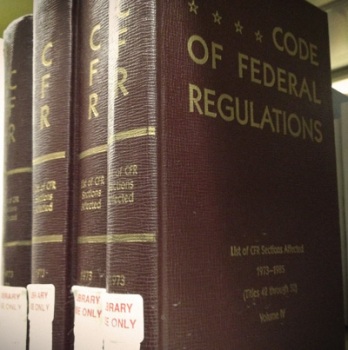EPA Tries to Blame Bad FOIA Regs on Advisory Committee Recommendation: FRINFORMSUM 11/1/2019

Finding agency FOIA regulations can be a difficult task.
EPA Tries to Blame Bad FOIA Regulations on Advisory Committee
The Environmental Protection Agency is trying to blame a recommendation from the FOIA Federal Advisory Committee for its controversial new FOIA regulations, which centralizes the agency’s FOIA submission process within the EPA’s headquarters’ office in D.C. and away from the agency’s regional offices. The new rule, issued in June, allows the administrator and other officials “to review all materials that fit a FOIA request criteria, known as responsive documents, and then decide ‘whether to release or withhold a record or a portion of a record on the basis of responsiveness or under one or more exemptions under the FOIA, and to issue ‘no records’ responses.” It seems likely that the rule will expand the circle of non-FOIA officials who can make final determinations on FOIA requests and allow the agency to functionally ignore any requests sent to regional offices.
In an Oct. 23 response to Rep. Katie Porter’s (D-CA.) July 9 letter, the EPA’s acting associate administrator Joseph Brazauskas says the move was in keeping with recommendations from the FOIA Federal Advisory Committee to centralize FOIA processing where appropriate. Rep. Porter didn’t buy the misreading of the FOIA Advisory Committee’s good recommendation. She noted that the EPA’s FOIA processing remains decentralized, while it’s the FOIA submissions policy that has changed. She says, “Centralized FOIA processing, when done properly, allows for one official to search and review records even when held by various offices, thereby eliminating substantial waiting time and duplication of efforts.” Porter further pointed out that “Centralized submissions with continued decentralized processing instead increases delays as FOIA requests are routed to the appropriate office or branch.”
Rep. Porter also argued that the EPA violated federal procedures (the Administrative Procedures Act) by changing its FOIA policy without offering notice and a public comment option, and requested the EPA provide documentations of its legal justifications for doing so. The Project on Government Oversight’s Sean Moulton has an excellent, in-depth analysis of the EPA’s lack of public comment here.
The EPA faced immediate backlash for the rule when it was published in the Federal Register in June. Long-time FOIA champion Senator Chuck Grassley tweeted, “Americans deserve 2kno what their govt is up to Freedom of Information Act designed to promote transparency when govt lacks openness but recent SCOTUS ruling+EPA &Interior regs undermine FOIA I will write legislation 2fix TRANSPARENCY BRINGS ACCOUNTABILITY.” Senator Patrick Leahy added, “Congress won’t sit idly by while @EPA further guts FOIA w. an offensive rule allowing politicals to reject #FOIA requests w/o explanation. @EPAAWheeler: a friendly reminder that #Appropriations has oversight responsibilities. We’ll be chatting about this.” Sens. Grassley and Leahy, along with Sen. John Cornyn and Sen. Dianne Feinstein, introduced a bill, the Open and Responsive Government Act of 2019, in direct response to the EPA’s rule that “directly eliminates any agency’s authority to withhold any public documents under a basis of non-responsiveness.”
NARA Investigates Wilbur Ross’ Use of Private Email
Politico’s Josh Gerstein reports that the National Archives and Records Administration is investigating Commerce Secretary Wilbur Ross’ use of private email for government business. Ross’ use of private email was revealed in a FOIA lawsuit filed by Democracy Forward, and the FOIA-released documents show that, “From a nongovernment account, Ross has sent or received official correspondence about discussions with the European Commission for Trade, a U.S. ambassador’s meeting with German car manufacturers, a dinner featuring the ambassador of Japan, what appears to be an event related to billionaire businessman Bill Koch, and meeting requests from the far-right Internet troll Charles Johnson.”
NARA’s Laurence Brewer wrote in an October 9 letter to the Commerce Department’s chief information officer that, “The National Archives and Records Administration (NARA) has become aware of a potential unauthorized disposition of U.S. Department of Commerce records… In accordance with 36 CFR 1230.16(b), NARA requests that the Department respond within 30 calendar days to the allegation.”
Ross joins at least eight other current and former Trump administration officials who have been reported to use their personal emails for official business, including Ivanka Trump and Jared Kushner, adviser Steven Miller, former adviser Steve Bannon, former deputy national security adviser K.T. McFarland, as well as former chief of staff Reince Priebus and former National Economic Council director Gary Cohn.
ACLU Files FOIA Suit over Facial Recognition Info
The ACLU recently filed a FOIA suit against the Justice Department, the Drug Enforcement Administration, and the FBI for documents on their use of facial recognition software. Specifically, “ACLU attorneys asked a federal court in Massachusetts to order the agencies to release documents about how the government uses and audits the software, how officials have communicated with companies that provide the software, and what internal guidelines and safeguards regulate its use.” The ACLU filed its FOIA requests with the defendants in January, but received no response. In its press release regarding the suit, the ACLU’s Kade Crockford cites the FBI’s Facial Analysis, Comparison, and Evaluation (FACE) unit, which searches 641 million facial photos, including those from driver’s license databases.
 Nuclear Weapons and Turkey Since 1959
Nuclear Weapons and Turkey Since 1959
The current crisis with Turkey over Syria has raised questions, yet to be resolved, about the security of 50 U.S. nuclear weapons stored at Incirlik Air Base. These questions have been posed before, going back almost to the start of nuclear deployments in Turkey in 1959. How the United States responds carries implications for the region, for U.S.-Turkey relations, and for NATO. The National Security Archive recently posted a selection of declassified documents from various sources, including the Digital National Security Archive, in order to provide historical context to the situation.
Sign Up
Want to stay on top of the latest FOIA news? Click here to sign up for our weekly FRINFORMSUM (Freedom of Information Summary) email newsletter.

Comments are closed.